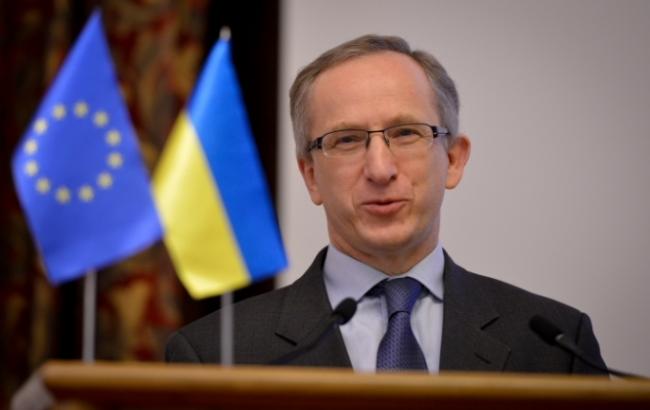Investigative action, including searches and arrests of bank accounts (on a sum of about 90 million UAH) were conducted in the offices of three companies: the Russian TV Channel Union, which represents First Channel on Ukrainian territory, Torsat company which owns the rights to broadcast Russian TV channels on Ukrainian territory, and Sattelecom company which provides technical broadcasting services for satellite signals of Russian TV channels on Ukrainian territory.
As advisor to the Ukrainian Minister for Internal Affairs Anton Hermshchenko reported at the briefing, the investigation conducted earlier established that, first, the companies violated the decision of the Kyiv District Court and continued to broadcast Russian TV channels which are leading the informational propaganda war against Ukraine: First Channel. Worldwide Network, RTR-Planeta, NTV-Mir, Rossiya-24, TVCI and RBC-TV.
“The funds received from signal broadcasting and ad time sales on the given channels are sent by the aforementioned companies to, amongst other things, finance terrorist group activities on the territory of Ukraine. Investigators have proven facts. According to the court decision, the offices had financial documentation and digital information storage confiscated, and the accounts of the companies were arrest, the overall sum is 90 million UAH,” Herashchenko also reported.
Torsat confirmed the search to the press. As the company’s press service reported, in the morning on October 24, the police, executing the decision of the Pechersk Court of the city of Kyiv, confiscated documents which have to do with the company’s activity in broadcasting Russian TV channels.
“Torsat provided all the documents in full to the law enforcement representatives… The company executed the court decision on March 25, 2014, to suspend broadcasts of RTR-Planeta, First Channel, NTV Mir and Vesti 24 on Ukrainian territory. The company executed the court decision to suspend the broadcasts of Russian TV channels in full, within the framework of Ukraine’s current legislation,” notes the company’s press service.
According to Internal Minister Arsen Avakov, Russian media and certain political parties in Ukraine may speculate on the events that occurred today. He also noted that as Torsdat also ensures the broadcast of Inter TV channel, the MIA may be accused of interfering with this channel’s work. Therefore, Avakov assured that, according to his personal orders, the investigation was conducted in a way not to disrupt the broadcast of Inter. The management of this channel has abstained from commenting at the moment.
Experts: Ukraine has the right to stop the broadcasts of anti-Ukrainian channels, however, within legal limits
Meanwhile author and anchor of Podrobytsi program which is broadcasted on Inter, Russian journalist Yevgeny Kiselev told Radio Liberty that those who want to watch Russian news or Russian TV series will be able to find an opportunity to do so, and forego state limitations. According to Kiselev, the ‘fans’ of Russian programs and series can watch them via satellite or the Internet
Kiselev also thinks that Ukraine currently has the right to temporarily suspend the broadcast of propaganda anti-Ukrainian channels, programs and movies.
“During times of war, the state has a full right to distance itself and its citizens from aggressive hostile propaganda,” Yevgeny Kiselev noted.
Kyiv-based political expert and publicist Vitaly Kulyk thinks that when we are talking about actions which target media, whatever they are, it is necessary to remember international conventions which ensure journalist activities, which Ukraine has to respect. Even if investigation is underway against Russian TV channels which are being used by the Kremlin as information weaponry, the Ukrainian law enforcement should act within the frame of law, the expert emphasized.
“Naturally, there should be enough reason, so that we later do not receive a lamentable blow, for example, in the European Human Rights Court. This court may approve the decision in favor of these TV channels, which (most likely) will protest against the actions of the Ukrainian government. Plus, I am not convinced of the efficacy of such actions: we can ban the broadcast of Russian channels, we can suspend or ban the undesirable propagandists from entering the country. However, I think that prosecuting journalists in Ukraine is not effective and not smart,” Kulyk says.
Executive director of the Ukrainian Helsinki Human Rights group Yevhen Zakharov advises the law enforcement not to forget that they are dealing with a sensitive sphere, such as information, and that it is necessary to respect the norms of current legislation. Investigative actions which include searches should not turn into a mechanism to intimidate the suspects, noted the human rights activist.
“According to the investigative law, they can conduct searches when there are significant grounds to think that the search will yield evidence of such and such aspects of the crime. And this is done within the framework of the investigation,” Zakharov noted.
According to the experts, the Ukrainian government will now have to maneuver between social demand which mostly supports the proposal to suspend broadcasting Russian TV channels and series which glorify Russian special services, and current international legislation, as well as its own guarantees in the plane of free speech.





